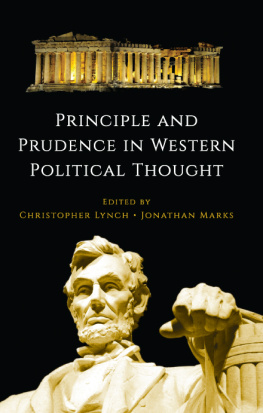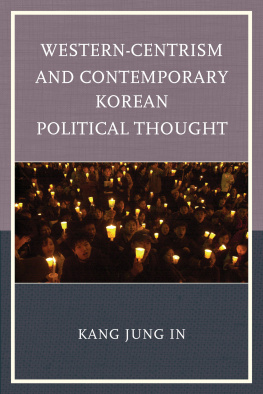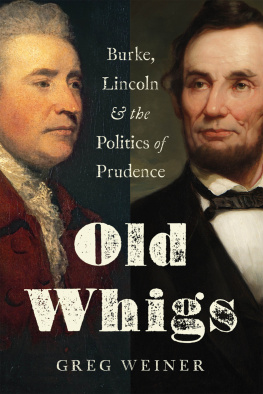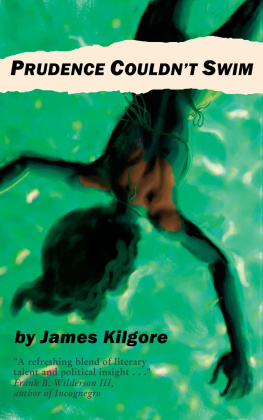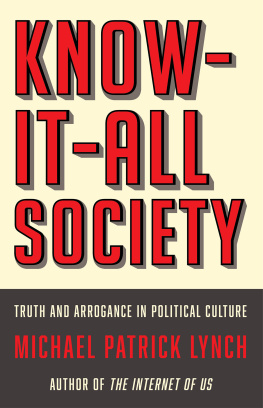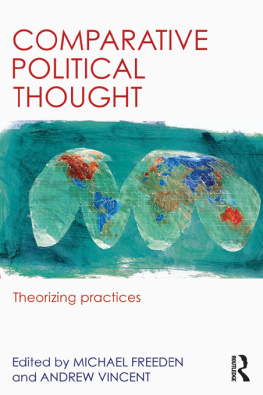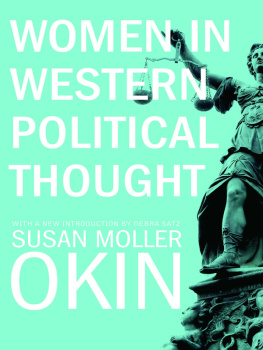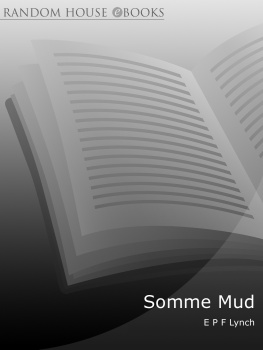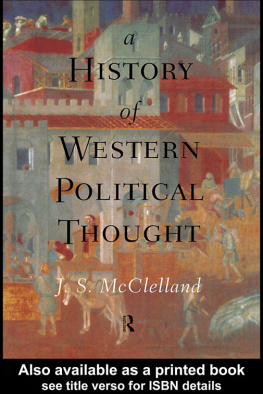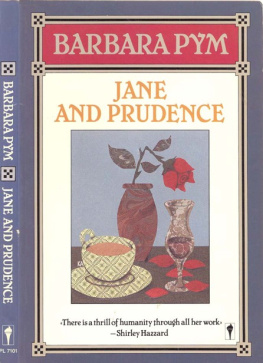Lynch Christopher - Principle and Prudence in Western Political Thought
Here you can read online Lynch Christopher - Principle and Prudence in Western Political Thought full text of the book (entire story) in english for free. Download pdf and epub, get meaning, cover and reviews about this ebook. City: Albany;New York, year: 2016, publisher: State University of New York Press, genre: Politics. Description of the work, (preface) as well as reviews are available. Best literature library LitArk.com created for fans of good reading and offers a wide selection of genres:
Romance novel
Science fiction
Adventure
Detective
Science
History
Home and family
Prose
Art
Politics
Computer
Non-fiction
Religion
Business
Children
Humor
Choose a favorite category and find really read worthwhile books. Enjoy immersion in the world of imagination, feel the emotions of the characters or learn something new for yourself, make an fascinating discovery.
- Book:Principle and Prudence in Western Political Thought
- Author:
- Publisher:State University of New York Press
- Genre:
- Year:2016
- City:Albany;New York
- Rating:5 / 5
- Favourites:Add to favourites
- Your mark:
- 100
- 1
- 2
- 3
- 4
- 5
Principle and Prudence in Western Political Thought: summary, description and annotation
We offer to read an annotation, description, summary or preface (depends on what the author of the book "Principle and Prudence in Western Political Thought" wrote himself). If you haven't found the necessary information about the book — write in the comments, we will try to find it.
Principle and Prudence in Western Political Thought — read online for free the complete book (whole text) full work
Below is the text of the book, divided by pages. System saving the place of the last page read, allows you to conveniently read the book "Principle and Prudence in Western Political Thought" online for free, without having to search again every time where you left off. Put a bookmark, and you can go to the page where you finished reading at any time.
Font size:
Interval:
Bookmark:

W ESTERN P OLITICAL T HOUGHT
SUNY series in the Thought and Legacy of Leo Strauss
Kenneth Hart Green, editor
Edited by
Christopher Lynch and Jonathan Marks

Cover image of the Lincoln Memorial: jclark / Bigstockphoto.com
Cover image of the Parthenon: krechet / Bigstockphoto.com
Published by State University of New York Press, Albany
2016 State University of New York
All rights reserved
Printed in the United States of America
No part of this book may be used or reproduced in any manner whatsoever without written permission. No part of this book may be stored in a retrieval system or transmitted in any form or by any means including electronic, electrostatic, magnetic tape, mechanical, photocopying, recording, or otherwise without the prior permission in writing of the publisher.
For information, contact State University of New York Press, Albany, NY
www.sunypress.edu
Production, Diane Ganeles
Marketing, Anne M. Valentine
Library of Congress Cataloging-in-Publication Data
Names: Lynch, Christopher, 1963 editor. | Marks, Jonathan, 1969 editor.
Title: Principle and prudence in Western political thought / edited by Christopher Lynch and Jonathan Marks.
Description: Albany : State University of New York Press, 2016. | Series: SUNY series in the thought and legacy of Leo Strauss | Includes bibliographical references and index.
Identifiers: LCCN 2015029670| ISBN 9781438461250 (hardcover : alk. paper) | ISBN 9781438461267 (e-book)
Subjects: LCSH: Political sciencePhilosophy.
Classification: LCC JA71.P746 2016 | DDC 320.01dc23
LC record available at http://lccn.loc.gov/2015029670
10 9 8 7 6 5 4 3 2 1
Students, friends, and colleagues of Nathan Tarcov
prepared this book in his honor. We dedicate it to him
in gratitude for infinite benefits received from him
over the course of decades.
C ONTENTS
Christopher Lynch and Jonathan Marks
Part I
Principle and Prudence in Athens and Jerusalem
Peter J. Ahrensdorf
Richard S. Ruderman
Karl Walling
Hillel Fradkin
Clifford Orwin
Part II
Principle and Prudence in Modern Political Thought
Vickie Sullivan
Jonathan Marks
Diana J. Schaub
Heinrich Meier
Richard Velkley
Paul Franco
Part III
Principle and Prudence in American Political Thought
Nathan Tarcov
Ralph Lerner
Steven B. Smith
Part IV
Principle and Prudence in the Thought of Leo Strauss
Svetozar Minkov
Christopher Lynch
17 Strausss Second Statement on Locke
Nasser Behnegar
Robert B. Pippin
I NTRODUCTION
C HRISTOPHER L YNCH AND J ONATHAN M ARKS
I n An Epilogue to Essays on the Scientific Study of Politics , Leo Strauss invokes the man from Missouri, that incarnation of the empirical spirit, who has to be shown. But to be shown, the man from Missouri does not insist upon methodological rigor or on arguments that take absolutely nothing for granted. Indeed, he himself takes it for granted that he lives with other human beings of all descriptions in the same world and that because they are all human beings they understand each other somehow; he knows that if this were not so, political life would be altogether impossible. Even and especially in the midst of his skeptical demand, the man from Missouri affirms the reality of the realm of politics. He assumes, in other words, that he operates within a world consisting of human beings debating and discussing what they should do about matters of importance to them.
The perspective of the man from Missouri is entirely abandoned by the type of political science criticized by Strauss. This new political science looks at political things from without, in the perspective of a neutral observer, in the same perspective from which one would look at triangles or fish. political speech frequently obscures. An ichthyologist may listen to the sounds a fish makes for clues to its behavior, but she is not going to get far asking it why it does what it does.
Strauss compares unfavorably this new political science to the old Aristotelian political science it rejects. That older political science views things in the perspective of the citizen. It assumes that what is important to the citizen as citizen is relevant, even essential, to the political scientists search for the truth about politics. In particular, the old political science orients itself by the qualitative differences among regimes, between the qualitatively different purposes constituting and legitimating them that are the basis of a reasoned determination of what is and what is not a matter of political importance. Like the man from Missouri, adherents of the old political science are not inclined to understand the differences between Athens and Sparta, or liberalism and Islamism, as differences among ideologies, that is, more or less sophisticated prejudices. They are inclined instead to investigate the principles of preference that govern the political mans concern with what is to be done politically here and now, that is, his reasons for his decisions.
That does not mean the old political science permanently adopts the view of the man from Missouri. For one thing, the man from Missouri probably has a partisan perspective, whereas the political scientist or political philosopher must become the umpire whose perspective encompasses the partisan perspectives because he possesses a clearer grasp of mans natural ends and their natural order than do the partisans. The political philosopher, as umpire, does not eschew the partisan perspectives; he understands them on their own terms while determining their places with respect to the natural ends to which they point, however imperfectly; Strauss writes of such ends as constitutive of heterogeneity, of the separation of human things into whole spheres of activities or ways of life, the most decisively important of which is the political regime. Because the old political science adopts the perspective of the citizen and statesman only provisionally, it transcends that perspective. It nonetheless does not simply cancel or negate it; the old political science most certainly does not bypass the perspective of the citizen and statesman.
In quoting Strauss on the subject of the new political science, we do not mean to suggest that nothing has changed since 1962. But it is no less the case now than it was then that political science is considered a branch of the social sciences and that social sciences aspire to be more like the natural sciences than they are. The authors of political science articles today are no more likely than they were then to look The insight into the limitations of conventional social science that gives rise to constructivism represents a turn, not from a narrow political perspective toward a more comprehensive one, but from a political science that apes the natural sciences to cultural studiesand therewith constructivism abandons both science and politics.
This book explores the possibility that the bestand perhaps onlypath toward a non-arbitrary approach to the study of politics leads through the realm of politics as it presents itself in practice, independent of scientific theories as such but redolent with recourse to moral principles held in common by and within individual regimes, recourse, that is, to shared and competing understandings of the common good. We do not thereby deny the importance of the factors the new political science emphasizes, such as class, institutional structures, or maximization strategies; nor do we deny the importance of backroom deals and other secret machinations featured in more popular presentations of politics. But we consider the possibility that these factors are better seen as necessary conditions of political life than as the sum total of political life as it really is. We also doubt the ability of modern social and political science fully to grasp even these lower factors and to weigh their relative importance more adequately than the actors themselvesespecially the most capable of those actors. For no one can survive in the political arena for long without taking into account the internal motives and external constraints on other actual and potential political actors. The greater the prudence of the actor, the better will such factors be reflected in that actors judgments and arguments about what is good for his community.
Font size:
Interval:
Bookmark:
Similar books «Principle and Prudence in Western Political Thought»
Look at similar books to Principle and Prudence in Western Political Thought. We have selected literature similar in name and meaning in the hope of providing readers with more options to find new, interesting, not yet read works.
Discussion, reviews of the book Principle and Prudence in Western Political Thought and just readers' own opinions. Leave your comments, write what you think about the work, its meaning or the main characters. Specify what exactly you liked and what you didn't like, and why you think so.

